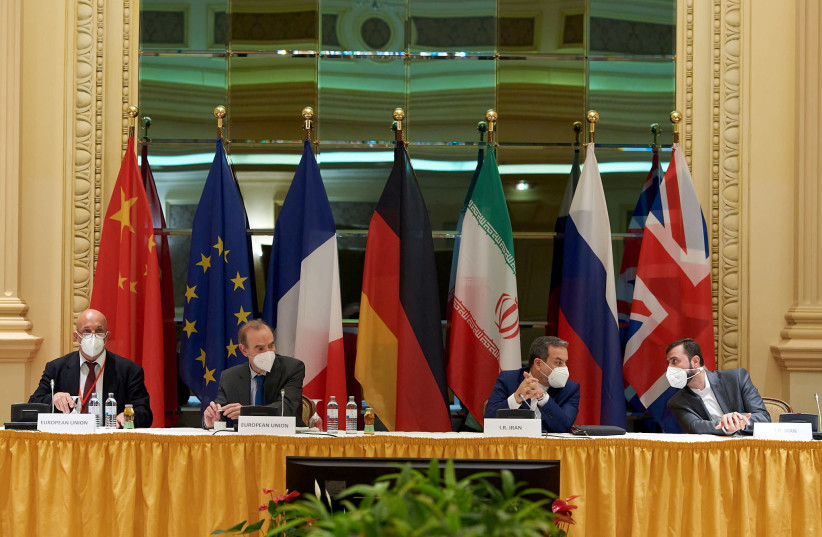No deal, however limited, can enable Iran to reach the nuclear threshold – editorial
The US seems intent on reaching an informal deal with Iran over its nuclear program.
Known as the “less for less” nuclear deal, the plan reportedly under consideration would mean some partial nuclear concessions by the Islamic Republic, in return for partial sanctions relief by the West. It would reportedly entail Tehran cutting its nuclear enrichment at 60% in exchange for the US waiving sanctions, specifically allowing Iraq to pay more than $10 billion it owes Iran for gas and electricity, and for South Korea to pay $7 billion for oil imports.
The US withdrew from the 2015 Joint Comprehensive Plan of Action (JCPOA) Iran deal in 2018 under the Trump administration. Some observers maintain that while the Biden administration has realized it cannot keep the president’s campaign promise to return to the 2015 deal, it is seeking to set the Iran issue aside at least until the 2024 presidential election.
Implications for US-Israeli relations and Israel’s security
As The Jerusalem Post’s Lahav Harkov has noted, the informality of the deal is likely an attempt by the Biden administration to avoid congressional review in line with legislation that also requires the president to “determine the agreement in no way compromises the commitment of the United States to Israel’s security, nor its support for Israel’s right to exist.”
According to Reuters, a Western official said that the key objective of the impending nuclear deal between the US and Iran is to stop Israel from attacking Iran.
 European External Action Service (EEAS) Deputy Secretary General Enrique Mora, Iranian Deputy at Ministry of Foreign Affairs Abbas Araghchi and Iran’s ambassador to the U.N. nuclear watchdog Kazem Gharibabadi wait for the start of a meeting of the JCPOA Joint Commission in Vienna, Austria May 1, 202 (credit: EU DELEGATION IN VIENNA/HANDOUT VIA REUTERS)
European External Action Service (EEAS) Deputy Secretary General Enrique Mora, Iranian Deputy at Ministry of Foreign Affairs Abbas Araghchi and Iran’s ambassador to the U.N. nuclear watchdog Kazem Gharibabadi wait for the start of a meeting of the JCPOA Joint Commission in Vienna, Austria May 1, 202 (credit: EU DELEGATION IN VIENNA/HANDOUT VIA REUTERS)“If [the] Iranians miscalculate, the potential for a strong Israeli response is something that we want to avoid,” the official said.
Netanyahu’s comments on the proposed deal
Although the Prime Minister’s Office refused to comment, Prime Minister Benjamin Netanyahu has repeatedly said that any deal between Washington and Tehran will not stop Jerusalem from taking steps against the threat of a nuclear Iran.
“Our first mission is to stop the nuclearization of Iran,” Netanyahu said at Sunday’s cabinet meeting, reiterating Israel’s opposition to the JCPOA.
“The most limited understandings, what are termed ‘mini-agreements,’ do not – in our view – serve the goal and we are opposed to them as well,” he added.
State Department spokesperson Matthew Miller denied there was any deal with Iran. However, Miller said that the US wants Iran to curb its nuclear program and take several other steps to reduce its negative role across the Middle East and around the world, including in Ukraine. “We continue to use diplomatic engagements to pursue all of these goals,” Miller added, without giving details.
Recent developments raise concern
Several recent developments should raise significant red flags.
Last week, while denying that Iran is seeking nuclear arms, Iranian Supreme Leader Ayatollah Ali Khameini nonetheless bragged, “The West could not stop Iran from building nuclear weapons if Tehran wanted to pursue a nuclear arms program.”
US intelligence services believe that from the moment Iran begins the process of building a nuclear bomb, it would take about 12 days to enrich uranium to a high, military, level of 90 percent.
The International Atomic Energy Agency (IAEA) recently dropped its investigation into what Israeli intelligence said is an undeclared nuclear site at Marivan.
Finally, Iran’s official news agency IRNA announced on June 6 that it had successfully produced a hypersonic missile with a range of up to 1,400 km.
These developments should also be seen against the backdrop of the rapprochement between Saudi Arabia and Iran, facilitated by China. Although the Biden administration still seems keen on achieving Israeli-Saudi normalization, it is likely to involve the promotion of a Saudi civilian nuclear program and the sale of advanced US weapons, among other things. This could trigger a nuclear arms race in the Middle East.
The wider impact
In addition, the use of Iranian drones by Russia in its offensive on Ukraine cannot be ignored. Europe, within range of Iranian ballistic missiles, cannot be complacent about the threats and the US needs to understand the dangers of boosting Iran diplomatically and financially.
In Israel, despite the polarized political situation, this is one topic on which both the coalition and opposition agree. There is a blame game over whose fault it is that Iran is now so close to a nuclear breakout, but no one is under any illusion regarding the dangers from Iran.
Israel might be the primary target, but nowhere would be safe if Iran reaches the nuclear threshold.





Comments are closed.